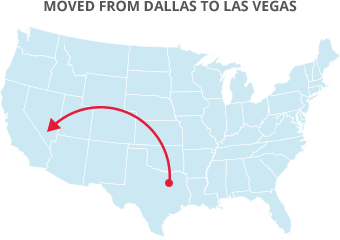

By Julie DeLong, A-1 Freeman Moving Group
 Moving across the country? You are not alone--last year over 3 million Americans crossed a state line to a new house. Many those moves were across the country and others may
have been across town, but every single
one of those families had to uproot all their stuff, put it onto a moving truck, and hope for the
best. If you are thinking
about a move, there is no question
you've been online to research
moving companies and have gone down the path of terrible
move anecdotes on different websites. How do you manage your residential move so
that you're not preyed upon by moving scammers,
and that your belongings arrive at your new home
in Wichita Falls safe and sound?
Moving across the country? You are not alone--last year over 3 million Americans crossed a state line to a new house. Many those moves were across the country and others may
have been across town, but every single
one of those families had to uproot all their stuff, put it onto a moving truck, and hope for the
best. If you are thinking
about a move, there is no question
you've been online to research
moving companies and have gone down the path of terrible
move anecdotes on different websites. How do you manage your residential move so
that you're not preyed upon by moving scammers,
and that your belongings arrive at your new home
in Wichita Falls safe and sound?Start by learning the vocabulary of the transportation industry. It's a lot easier to make sound decisions if you grasp the language of the business and the diverse business models of moving companies. This glossary of terms, found on the Federal Motor Carrier Safety Administration website, aids you to familiarize yourself with Mover-talk so that when you hear terms like cubic weight, valuation and released value, you’ll comprehend what they refer to.
The FMCSA website is a terrific beginning point in general, as it also outlines the guidelines, if you will, that licensed carriers abide by. Any moving company you are pondering needs to be registered with the US Department of Transportation, and carry a Motor Carrier and DOT number. You can look for any issues lodged against a company from that website. The ones on Yelp and Reddit are more entertaining, but any grievances filed with the DOT tend to have a higher level of truth than issues that are probably the result of the consumer just not paying attention.
In an optimal world, you would hire movers several months ahead of time, and unhastily pack, manage the family, and be 100% ready when the guys on the truck show up. Real life is not so simple, and that's what moving scammers count on when they're promising you the sun—you're busy and thinking about a million things, so they appeal to your sense of urgency—here is a rough estimate and a handshake and we will handle the details later. This is a surefire way to never see your stuff again, unless you want to buy it back on Craigslist.
Rather, ask your realtor for a name of a moving company. Or, if you are friends with anyone who's moved not too long ago, ask them who they used. National moving companies normally have locations all over the country, so you can ask your Uncle in Nebraska who they used, even if you live in Connecticut. Use the FMCSA website to search movers registered for interstate moves, and Google them. Once you have pared down the list to a couple options, schedule a time to get written in-home estimates.
Make sure to look at the FMCSA publication, "Your Rights and Responsibilities When You Move". When hiring a professional mover, it's a federal law that you are supplied with this 25-page booklet (or a link to it) that outlines your rights, protection, and industry regulations.
It is important that you spot a rogue mover BEFORE they load your belongings. Remember, not all movers have your best interest in mind. So, keep these RED FLAGS closeby as you are talking with your potential mover.
Be wary of movers who:
It's better to be safe than sorry. So, be sure and check out your moving company before they load your things onto their truck! Remember that if it seems too good to be true it probably is, and since you are trusting the movers with what is effectively your life, do your research and hire a reputable moving company, like A-1 Freeman Moving Group, who will take good care of you when you move to Wichita Falls.

